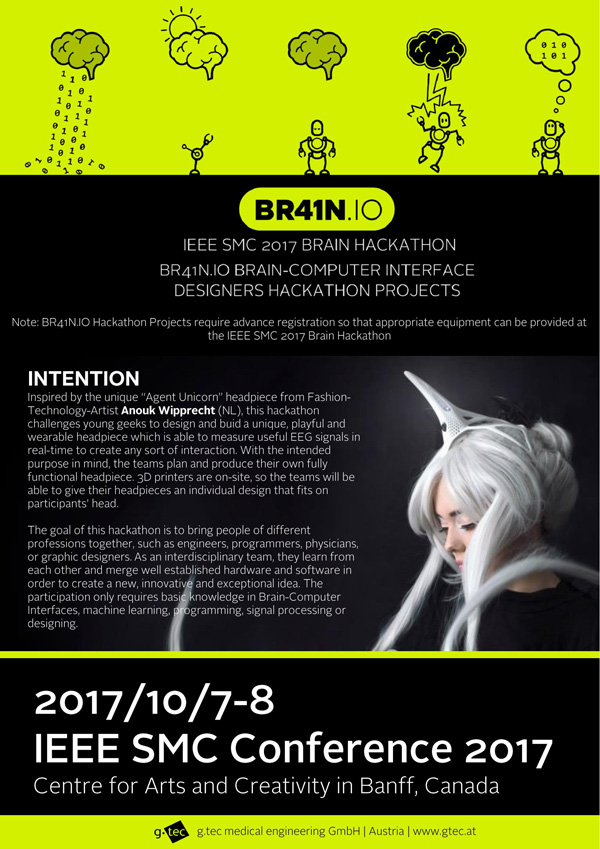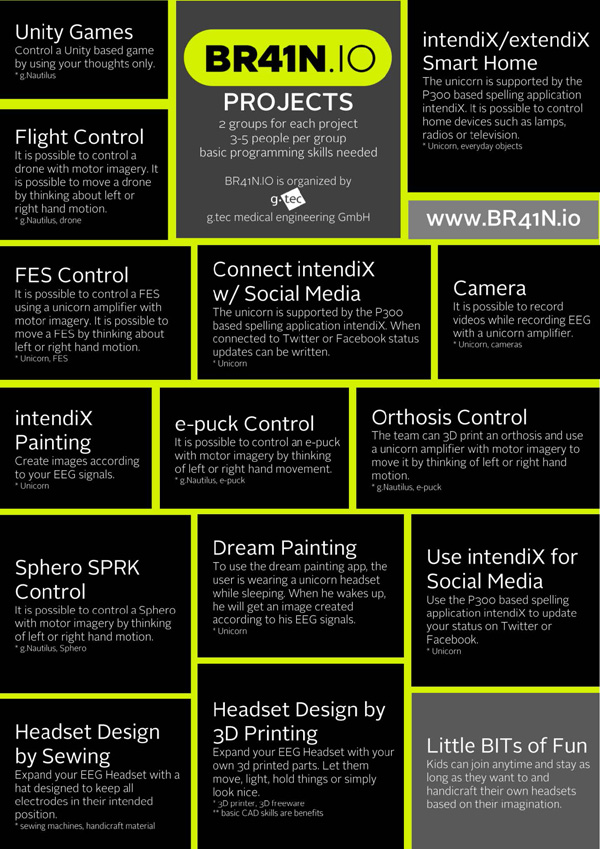What’s a Hackathon? Hackathons are brainstorming and collaborative marathons designed to rapidly produce working prototypes. Conventional hackathons typically bring developers and technologists together over 24, 36, 48 or more hours to cram and build solutions that they can present.
Why do a Brain Hackathon? By putting creative minds from multiple disciplines together for a short period of time, we have the opportunity to discover and uncover possibilities for using BCI-related hardware and software not readily thought of. Hacks and innovation developed from hackathons have great potential for commercialization.
Who Can Participate? Anyone! Both SMC2017 attendees and non-SMC2017 attendees with interests in BCI/BMI, cloud technologies, IoT, robotics, AR, VR, machine learning, sensors, 3D printing and design, human-machine interface systems, control, signal processing, big data, haptics, rehabilitation, and similar areas. You do not have to be a BCI expert to participate on a team! Interdisciplinary teams with a combination of BCI and non-BCI skills are often successful in building solutions and producing working prototypes.
Can Students Compete? Yes! The student competition is still open to high school students and undergraduates.
General Information
Date: October 7-8, 2017
Cost: Free
Place: Banff Centre for Arts and Creativity, 107 Tunnel Mountain Drive Banff, Alberta, Canada T1L 1H5
Register: Register at the 2017 IEEE SMC Brain Hackathon website
Participants:
- Teams of up to five persons
- Maximum participants: 200 individuals/40 teams
- IEEE members will be given priority
Scope:
- Integration of BCI with the Internet of Things (IoT)
- Collaborative (multi-person) Brain-Computer Interfaces (BCIs)
- BCI integration with games, mobile technologies, and Virtual/Augmented Reality (VR/AR)
- Active BCI control of robotic devices
- Design 3D printed headsets; combine BCIs with fashion technology and artistic application (in partnership with BR41N.IO)
Hardware/Software:
- A list of available hardware and software (as per the Scope section above) will soon be posted on the 2017 IEEE SMC Brain Hackathon website. Participants are also encouraged to bring their own hardware.
- Attached at the end of this document is a list of additional Hackathon projects that will be offered only by BR41N.IO.
Awards: $4,000 in cash and hardware prizes: a $1,000 IEEE Brain Initiative Brain Hackathon Prize, a $1,000 IEEE SMC Brain Hackathon Prize, a $1,000 Qusp Prize, and a $1,000 BR41N.IO Prize.
Sponsors:
- Institutions:
- IEEE, IEEE SMC, IEEE Brain Initiative, IEEE Computational Intelligence Society, IEEE Magnetics, IEEE Consumer Electronics Society, IEEE Systems Council
- Partners:
- BR41N.IO Brain-Computer Interface designer Hackathon series
- Industry Volunteers:
- g.tec medical engineering GmbH
- Qusp Labs
Activity Description
The Hackathon will begin with a summary talk about various BCI platforms (several are open source) and will help participants gain additional knowledge and familiarity with software tools and hardware. Teams of up to five members will confirm their project title and hardware and software platform on the morning of the first day. Participants are encouraged to form teams, define their projects, and select their hardware and software platforms in advance of the Hackathon (additional information will be provided on the website). High-speed Internet access will be provided at the Hackathon.
Professional mentors and experts will be on hand throughout the Hackathon to provide fundamental application development know-how and tips, and to demonstrate the utility of some of the sponsored hardware/software.
The evening of the first day will feature discussions of progress and obstacles encountered. Participants can continue to develop their project or further brainstorm ideas through social interactions with peers, instructors, and manufacturer representatives throughout the evening. Food and beverages will be available.
The second day will continue with more hacking. The submission of final prototype/product/analysis/proof will be expected by 2:00 pm on the second day. Following short presentations and demonstrations by participants, Expert Panel will conduct evaluations to determine the winners. Evaluation criteria will be posted on the Hackathon website.
Partnerships:
Participants can additionally select from a range of pre-defined Hackathon projects supported by the BR41N.IO Brain-Computer Interface designer Hackathon series. Designers will be able to 3D-print their own headsets and design BCI systems, and—together with programmers—create new BCI systems.
Additional Information
We highly encourage Brain Hackathon participants to register for the 2017 IEEE SMC BMI Workshop at SMC2017—where the Brain Hackathon is held—to learn more about Brain-Machine and Brain-Computer Interfaces.
- Meet and talk with experts from around the world
- Listen to papers presented by experts, attend receptions, etc.
- Discuss potential master and doctoral projects with academic, governmental and industrial experts
(NOTE: While participation in the Brain Hackathon is free, registration for the BMI Workshop at SMC will require a fee)
For additional information or questions about the hackathon, please contact:
Michael H. Smith, PhD
Senior Advisor, IEEE Brain Initiative
Past President, IEEE Systems, Man, and Cybernetics Society Chair, 2017 IEEE SMC BMI Workshop
[email protected]
Tim Mullen
Chair, 2017 IEEE SMC Brain Hackathon
Qusp, USA
[email protected]
Christoph Guger, PhD
Co-Chair, 2017 IEEE SMC Brain Hackathon
BR41N.io series organizer
CEO g.tec medical engineering GmbH | Austria
[email protected]




